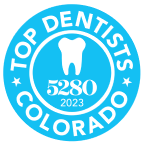
When a dentist performs a tooth extraction, he or she removes the entire tooth from its socket (dental alveolus). At Metropolitan Dental Care, our dentists strive to avoid extraction. However, it can be necessary. Because we understand that getting a tooth pulled can be nerve-wracking for some, our team strives to facilitate an experience that is as comfortable as possible. Schedule a consultation to see if:
- A dental extraction is necessary
- Our dentists can save your tooth via alternative means
Surprisingly, tooth extraction can protect a person’s oral health in specific scenarios. Here’s four:
1. Impacted Teeth
Sometimes, the mouth does not have enough room for a complete set of teeth. When the growth of one tooth pushes directly against another, impaction occurs. Tooth impaction may lead to an oral infection, which can increase the risk of:
- Mild to severe discomfort
- Swelling and redness
- Cysts and tumors
- Decay of neighboring teeth
For example, people expect wisdom teeth to emerge during their late teens or early adulthood. But, the third set of molars is prone to impaction. So, it’s common for dentists to remove wisdom teeth before they cause problems.
2. Irremediable Infection or Damage
Ideally, a dentist will be able to preserve the natural tooth structure as much as possible. With early intervention, dentists can sometimes save a tooth with dental fillings, crowns, or root canals. However, if the tooth and tooth root is so far gone that conservative methods will not do the trick, removal may be in order. After tooth extraction, a dentist can install a dental implant and restoration to elevate your smile in the most natural-looking and functioning way.
3. Orthodontic Treatment
Millions of Americans turn to braces or clear aligner therapy to mitigate misalignment. If a person’s jaw is not large enough to fit all of his or her teeth, overcrowding and crookedness are likely to happen. Before orthodontic treatment, a dental professional may encourage patients to eliminate protruding or impacted teeth. Removal creates more space in the mouth so that the remaining teeth can stand straight.
4. Advanced Periodontal Disease
Although largely preventable, periodontal (gum) disease affects almost half of adults over 30. While the earliest stage (gingivitis) is reversible, periodontitis is not. As the disease advances, the gums and supporting tissue deteriorates. Over time, teeth can loosen and fall out. Instead of allowing this to happen, a dentist may suggest removing a tooth before infection can spread to the supporting bone.
Learn More About Comfortable Tooth Extraction in Denver, CO
The bottom line is that most dentists attempt to save and keep the natural tooth intact if possible. However, dentists may recommend pulling an unwanted tooth to avoid further damage or health problems.
At Metropolitan Dental Care, our dedicated dentists orchestrate gentle yet effective dental extractions when necessary. Serving Denver and surrounding areas, our doctors advocate and cater to patients every step of their tooth removal journey:
- Pre-extraction: After carefully examining the mouth with a contemporary digital x-ray, our team will carefully identify the extent of the damage and whether the tooth is salvageable (or not).
- During the extraction: We supply just-the-right-amount of local anesthesia and sedation (if necessary).
- Post-extraction: Our team coaches individuals on how to take care of themselves during recovery.
Finally, get the relief that you deserve. Schedule your initial consultation at our Denver office. Call (303) 534-2626 or send us a message today.

